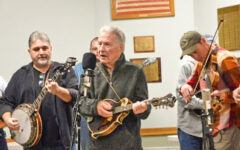
 Young English banjo player John Breese recently graduated from the University of Southampton, having completed a year-long Masters course in Music, majoring in classical guitar.
Young English banjo player John Breese recently graduated from the University of Southampton, having completed a year-long Masters course in Music, majoring in classical guitar.
For one of his modules Breese made a film Bluegrass & Old-Time: An Exploration of the Music in the UK, rather than writing a paper as part of his studies, “The community is fantastic over here and I really wanted to convey that in a film”, Breese asserted.
“I wanted to depict an honest view of the scene in the UK according to what I know of it in my experience. Anyone who watches the film can see the sense of community, encouragement and humour within the music here.
The course was fairly open, with one module offering an individually negotiated topic of study to be presented in the form of an essay or equivalent. Breese went on to explain,
“I approached the professor of rock and pop with my proposition to make a film about the bluegrass and old-time community in the UK and got a positive reaction. The support I received from the University was fantastic, despite lack of equipment or any funding to offer.
It was technically very difficult to record and produce the film completely on my own, as I was having to deal with a crew of only me with no experience in any kind of filming, and an extremely tight budget.”
After applying for funding through a variety of organisations, the British Bluegrass Music Association offered some financial help.
“I was able to ask within the community for help with things like how to edit audio, … the best kinds of lenses to buy and how to deal with different lighting situations. Most of this information was very useful, as it was not something you could find out from reading a book on the subject.”
The 25 minute film is now posted on YouTube. It includes interviews with some prominent members of the bluegrass music community in a region stretching from the Cotswolds, where the Sore Fingers Summer Schools (Kingham Hill) is located – the subject of a recent article in Bluegrass Unlimited by my Bluegrass Today colleague Chris Stuart – down through to Somerset and Avon. With good footage of jam sessions and stage performances it provides some good samples of British bluegrass musicianship in the 21st century.
http://www.youtube.com/watch?v=zhgIb1SlfS4Breese began learning to play the banjo when he was 16, taking lessons from local Bath teacher and performer Leon Hunt.
“Leon put me onto Sore Fingers Summer Schools where I met a wealth of new friends with similar interests.”
With what he describes as “a certain amount of work and dedication,” Breese progressed and soon went on to play with the Carrivick twins, from South Devon, and to teaching budding young bluegrass prospects.
So, how successful has Breese move into the music profession been?
“Since graduating as a Master of Music with distinction from a reputable university, my parents find it hilarious that I am now a professional banjo player. I am almost able to scrape by and make a living through touring with the Coal Porters, and teaching with the Bath Bluegrass School.
The nature of bluegrass music is similar to jazz in that, generally speaking, it is difficult to become a recognised figure within the scene unless you are technically and musically proficient.
I enjoy the competitiveness of the music in this country as everyone is still very friendly despite this fact. There are many who say that it is impossible to make a living as a professional bluegrass musician in this country. Perhaps this is true, but I am giving it my best shot!”







